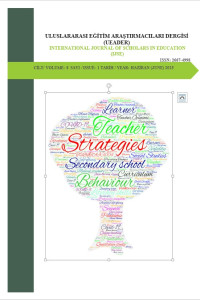Abstract
This study aims to explore science teachers’ perspectives on the implementation of STEM (Science, Technology, Engineering, Mathematics) applications through a Design Thinking (DT) approach. Employing a qualitative case study design, semi-structured interviews were conducted with 11 science teachers selected via maximum variation sampling, a purposive sampling strategy. Data were analyzed through content analysis. The findings reveal that science teachers generally perceived DT-based STEM applications positively, particularly in terms of enhancing instructional effectiveness. Participants reported that these practices supported both their professional and personal growth, fostered greater classroom interaction, and improved student motivation. Additionally, the teachers emphasized a strong connection between STEM activities and the development of computational thinking skills—especially in fostering algorithmic thinking, problem-solving, and systematic analysis. Despite these benefits, several implementation challenges were noted, including time constraints, curriculum overload, limited resources, classroom management issues, and occasional lack of student engagement. Overall, the study concludes that the design-based thinking approach serves an integrative function in embedding creative and computational thinking within STEM education, offering multifaceted benefits for both students and educators.
References
- Akgündüz, D., Aydeniz, M., Çakmakçı, G., Çavaş, B., Çorlu, M. S., Öner, T., & Özdemir, S. (2015). STEM eğitimi Türkiye raporu. Scala Basım.
- Batı, K., Çalışkan, İ., & Yetişir, M. İ. (2017). Fen eğitiminde bilgi işlemsel düşünme ve bütünleştirilmiş alanlar yaklaşımı (STEAM). Pamukkale Üniversitesi Eğitim Fakültesi Dergisi, 41(41), 91–103.
- Büyüköztürk, Ş., Kılıç Çakmak, E., Akgün, Ö. E., Karadeniz, Ş., & Demirel, F. (2012). Eğitimde bilimsel araştırma yöntemleri (32. baskı). Pegem Akademi.
- Creswell, J. W. (2013). Nitel araştırma yöntemleri: Beş yaklaşıma göre nitel araştırma ve araştırma deseni (M. Bütün & S. B. Demir, Edt.). Siyasal Kitabevi.
- Çakır, Z., & Yalçın, S. A. (2020). Okul öncesi eğitiminde gerçekleştirilen STEM eğitimlerinin öğretmen ve veli görüşleri açısından değerlendirilmesi. International Journal of Active Learning, 5(2), 142–178.
- Çınar, S., & Terzi, S. Y. (2021). STEM eğitimi almış öğretmenlerin STEM öğretimi hakkındaki görüşleri. Van Yüzüncü Yıl Üniversitesi Eğitim Fakültesi Dergisi, 18(2), 213–245. https://doi.org/10.33711/yyuefd.1028596
- Elwood, K., & Jordan, M. E. (2022). Development of the Design Thinking and Instructional Lessons (DTAIL) model: A creative approach for teachers. Educational Technology Research and Development, 70(5), 1781–1807.
- Frear, L., & Fillip, C. (2019). Delving into design: Using design thinking in STEM curriculum environments. In ICERI2019 Proceedings (pp. 9226–9226). IATED.
- Goldman, S., Carroll, M., Zielezinski, M. B., Loh, A., Ng, E. S., & Bachas-Daunert, S. (2014, June). Dive in! An integrated design thinking/STEM curriculum. In 2014 ASEE Annual Conference & Exposition (pp. 24–440). ASEE.
- He, W., Yan, J., Wang, C., Liao, L., & Hu, X. (2023). Exploring the impact of the design thinking model on fifth graders’ creative self-efficacy, situational interest, and individual interest in STEM education. Thinking Skills and Creativity, 50, 101424.
- Ho, T. E. (2025). Outcomes of an integrated STEM with design thinking module on preschoolers’ science process skills. Journal of Early Childhood Research, 1476718X251325675. https://doi.org/10.1177/1476718X251325675
- İnançlı, E., & Timur, B. (2018). Fen bilimleri öğretmen ve öğretmen adaylarının STEM eğitimi hakkındaki görüşleri. Uluslararası Bilim ve Eğitim Dergisi, 1(1), 48–68.
- Mahil, S. (2016). Fostering STEM+ education: Improve design thinking skills. In 2016 IEEE Global Engineering Education Conference (pp. 125–129). IEEE. https://doi.org/10.1109/EDUCON.2016.7474564
- Miles, M. B., & Huberman, A. M. (1994). Qualitative data analysis: An expanded sourcebook. Sage.
- Öztürk, A. (2020). Co-developing STEM activities through design thinking approach for fifth graders (Unpublished doctoral dissertation). Middle East Technical University. Partnership for 21st Century Skills. (2016). P21 framework definitions. https://www.marietta.edu/sites/default/files/documents/21st_century_skills_standards_book_2.pdf
- Saavedra, A. R., & Opfer, V. D. (2012). Learning 21st-century skills requires 21st-century teaching. Phi Delta Kappan, 94(2), 8–13. https://doi.org/10.1177/003172171209400203
- Sarı, U., & Karaşahin, A. (2020). Fen eğitiminde bilgi işlemsel düşünme: Bir öğretim etkinliğinin değerlendirilmesi. Turkish Journal of Primary Education, 5(2), 194–218.
- Sarıkoç, Z., & Ersoy, H. (2022). Tasarım odaklı düşünme yaklaşımıyla STEM uygulamaları: SPAM eTwinning projesi örneği. Fen Matematik Girişimcilik ve Teknoloji Eğitimi Dergisi, 5(2), 98–122.
- Vianna, M., Vianna, Y., Adler, I. K., Lucena, B., & Russo, B. (2012). Design thinking. MJV Press.
- Wingard, A., Kijima, R., Yang-Yoshihara, M., & Sun, K. (2022). A design thinking approach to developing girls’ creative self-efficacy in STEM. Thinking Skills and Creativity, 46, 101140.
- Wu, B., Hu, Y., & Wang, M. (2019). Scaffolding design thinking in online STEM preservice teacher training. British Journal of Educational Technology, 50(5), 2271–2287. https://doi.org/10.1111/bjet.12895
- Yalçın, V., & Erden, Ş. (2021). The effect of STEM activities prepared according to the design thinking model on preschool children's creativity and problem-solving skills. Thinking Skills and Creativity, 41, 100864.
- Yıldırım, B. (2016). An analyses and meta-synthesis of research on STEM education. Journal of Education and Practice, 7(34), 23–33.
Details
| Primary Language | English |
|---|---|
| Subjects | Curriculum and Instration (Other) |
| Journal Section | Articles |
| Authors | |
| Early Pub Date | June 13, 2025 |
| Publication Date | June 30, 2025 |
| Submission Date | June 5, 2025 |
| Acceptance Date | June 12, 2025 |
| Published in Issue | Year 2025 Volume: 8 Issue: 1 |
|
| |




